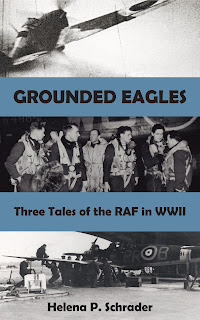All
the reasons for writing that I have listed up to now apply equally to
non-fiction and fiction. The primary reason that I prefer fiction as a
medium, however, is that it opens the potential audience to a greater
segment of the population.
I'm
perfectly aware that I do not write books for the "general public"
(whatever that is!). My books are not relevant to everyone and do not
interest everyone. I do not expect "everyone" -- not even my closest
friends and family -- to take an interest in, for example, Ancient
Sparta or 13th century Cyprus. Why should they share these arcane
interests simply because they happen to have been born in the same
family or have worked with me somewhere in the world? My friends and
family like me for the things we share, not necessarily the things I
write about.
But there are thousands, even tens of thousands of people around the world who do share
my interest in Sparta, the crusader states or aviation in the Second World War. They have studied these
topics academically or as a hobby. They read every book they can get
their hands on about these topics of interest -- fiction and
non-fiction, film or documentary. Through my writing, I connect with
them, and they are my loyal readers and fans. They follow my blog and
facebook entries on the historical background of my novels. They
recommend other sources and novels. We belong to the same little club.
And
then there are readers who aren't particularly interested in the
subjects of my novels and would never pick up a non-fiction book about
them to learn more, but are interested in "a good read." These are
people who wouldn't read a book "because it's set in 12th century
Cyprus," but might read a book "full of lessons we'd be foolish to
forget." (Chanticleer Review, The Last Crusader Kingdom) They may not be interested in the Third Crusade, but want to read "the Best Biography of 2017." (Envoy of Jerusalem).
Readers who couldn't care less about Emperor Frederick II may yet be
intrigued by a hero described by Kirkus Reviews as "like Shakespeare's
portrayal of the young prince Hal." (Kirkus, Rebels against Tyranny)
In
short, because fiction is about characters (people) as much (if not
more) than about historical events, it appeals to a wider audience. I
will never forget that when working on my dissertation about the German
Resistance to Hitler, I had a conversation with Graefin Yorck, the widow
of Peter Graf Yorck von Wartenburg. She confessed to me that "all she
ever knew" about the American Civil War she had learned from Gone with the Wind. The
same is true for millions of people who accept Shakespeare's Richard
III as history or have learned about Thomas Cromwell from Hilary Mantel.
It
is my hope that readers will come to share my interest in ancient
Sparta, the crusader states and the men who defended democracy in the air during WWII through my books. If not, I hope they will
nevertheless enjoy the stories for themselves and want to read more from my pen.
Riding the icy, moonlit sky, 
they took the war to Hitler.
Their chances of survival were less than fifty percent.
Their average age was 21.
This is the story of just one bomber pilot, his crew and the woman he loved.
It is intended as a tribute to them all.
Buy now on amazon
or Barnes and Noble.
 Disfiguring
injuries, class prejudice and PTSD are the focus of three
heart-wrenching tales set in WWII by award-winning novelist Helena P.
Schrader. Find out more at: https://crossseaspress.com/grounded-eagles
Disfiguring
injuries, class prejudice and PTSD are the focus of three
heart-wrenching tales set in WWII by award-winning novelist Helena P.
Schrader. Find out more at: https://crossseaspress.com/grounded-eagles

"Where Eagles Never Flew"
was the the winner of a Hemingway Award for 20th Century Wartime
Fiction and a Maincrest Media Award for Military Fiction. Find out more
at: https://crossseaspress.com/where-eagles-never-flew
For more information about all my books visit: https://www.helenapschrader.com





Well said, Professor!
ReplyDelete